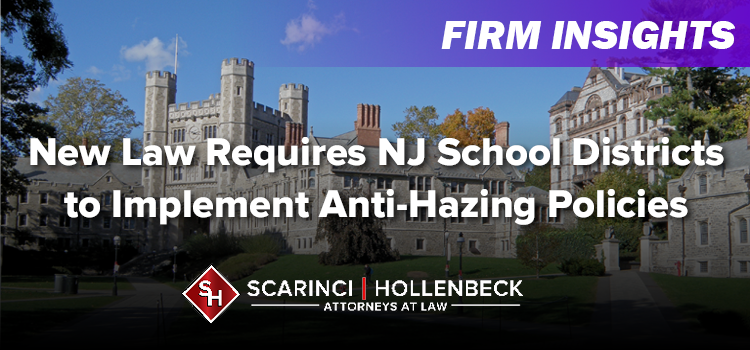
On August 24, 2021, New Jersey Gov. Phil Murphy signed Timothy J. Piazza’s Law...
On August 24, 2021, New Jersey Gov. Phil Murphy signed Timothy J. Piazza’s Law. The new law requires public and non-public middle schools and high schools, as well as higher education institutions, to adopt anti-hazing policies and penalties for violations of the policies. The law is named for Timothy Piazza, a 19-year-old Penn State University student who tragically died in 2017 during a fraternity hazing ritual.
“The safety of our students is our top priority, and we must do all that we can to protect them from cruel and dangerous hazing rituals,” Governor Murphy said in a press statement.“With today’s bill signing, we honor Tim Piazza’s life and make our strongest effort yet to root out hazing to prevent similar tragedies.”
Key Provisions of Timothy J. Piazza’s Law
The wide-ranging anti-hazing law (S84/2093)aims to deter hazing through increased awareness and enforcement. Below is a brief summary of several key provisions:
- Written anti-hazing policy: The law requires institutions of higher education, boards of education of school districts with a high school or middle school, and the governing board or chief school administrator of a nonpublic school with a high school or middle school, to adopt a written anti-hazing policy.
- Enforcement of anti-hazing policies: Higher education institutions and schools are required to provide a program for the enforcement of the anti-hazing policy and adopt penalties for violations of the policy. The penalties may include the withholding of diplomas or transcripts pending compliance with the rules and the imposition of probation, suspension, dismissal, or expulsion.
- Expanded definition of “hazing”: Under prior law, “hazing” was generally described as “conduct, other than competitive athletic events, which places or may place another person in danger of bodily injury.” The provisions of the new law broaden the types of activities which would be considered hazing to include any conduct that causes, coerces, or forces another person to: (1) violate federal or State criminal law; (2) consume any food, liquid, alcoholic liquid, drug or other substance which subjects the other person to a risk of emotional or physical harm; (3) endure brutality of a physical nature, including whipping, beating, branding, calisthenics, or exposure to the elements; (4) endure brutality of a mental nature, including activity adversely affecting the mental health or dignity of the individual, sleep deprivation, exclusion from social contact or conduct that could result in extreme embarrassment; (5) endure brutality of a sexual nature; or (6) endure any other activity that creates a reasonable likelihood of bodily injury to the person.
- Safe harbor: Immunity from prosecution for hazing is available to any person, student or fraternal organization, or institution of higher education, as well as another person acting in concert with the person, organization, or institution if 9-1-1 is called or other emergency services contacted. In order for this immunity to apply, the caller and, if applicable, person acting in concert with the caller would have to remain on the scene with a person injured as a result of hazing and cooperate with emergency services upon their arrival.
- Higher ed reporting: Institutions of higher education are required to maintain a report for violations reported to the institution, which includes information on all violations of the institution’s anti-hazing policy and federal and State laws related to hazing. The institution is required to post the report on the institution’s website. The first report posted after the effective date of the bill is required to include information concerning violations that were reported to the institution for the five consecutive years prior to the effective date of the bill, to the extent the institution has retained that information. The report is to be updated biannually on January 1 and August 1.
- Enhanced criminal penalties: Under the new law, an actor who commits the crime of hazing is guilty of a crime of the third degree if the act results in death or serious bodily injury to another, and is guilty of a crime of the fourth degree if it results in bodily injury to another person. Otherwise, hazing is a disorderly persons offense. A crime of the third degree is punishable by a term of imprisonment of three to five years, a fine of up to $15,000, or both; a crime of the fourth degree is punishable by a term of imprisonment of up to 18 months, a fine of up to $10,000, or both; and a disorderly persons offense is punishable by a term of imprisonment of up to six months, a fine of up to $1,000, or both. The law further provides that a student or fraternal organization or an institution of higher education that knowingly or recklessly promotes or facilitates a person to commit an act of hazing will be subject to a fine of between $1,000 and $5,000 for an initial violation and a fine of between $5,000 and $15,000 for a subsequent violation.
If you have legal concerns related to the New Jersey anti-hazing law and how it may impact your school district, we encourage you to contact a member of Scarinci Hollenbeck’s Education Law Group at 201-896-4100.
